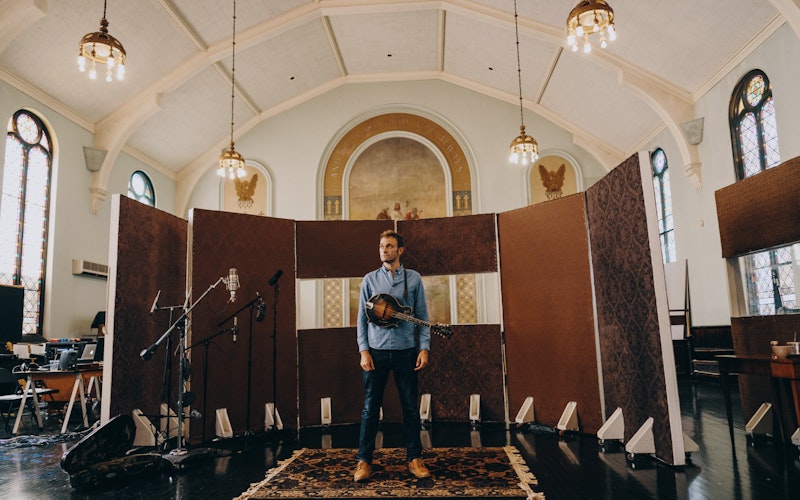
Music
Laysongs: Chris Thile’s Hymnal for Agnostics
Chris Thile stands before the assembly, inviting the gathered to open their Laysongs psalter. Flipping through, they notice an absence of musical markings or poetic verses. Rather, each page is stamped with a series of question marks.
“Tell us, oh, but then what shall we sing now?” Thile croons. “When we gather together, with a hard week going and a hard week coming, to catch our breath?”
Laysongs represents fresh, thrilling work from an American master. Few artists integrate head and heart like Thile. One-third of the blissful folk band Nickel Creek, he shaped a generation’s vision of what roots music could be. Leading the string-playing supergroup Punch Brothers, he bends imaginations like they are Uri Geller’s spoons.
Laysongs is a true solo effort. Thile’s sublime tenor instinctively coils with the mandolin—the instrument an extension of his spirit—then curls apart. His notes vibrate over, around, and off the rafters of the New York church where Laysongs was recorded during the pandemic.
Such resonance is by design. Here, Thile composes gospel music for agnostics: hymns for people who, on their best days, muster a “never say never” to God’s existence. Laysongs sheds a certain kind of light as Thile returns to the locus of his spiritual formation in order to know himself fully, out from under the church’s influence.
“It is a lifelong obsession of mine, even post-Christianity, what the impact of that kind of devotion to any organized religion is,” Thile says on his record label’s website.
Other artists might bend this obsession into their own sort of sermon. Thile’s songs are softer and more complicated than any screed. The album’s centerpiece, the three-part “Salt (in the Wounds) of the Earth,” certainly runs its fingers along Christianity’s scars. Inspired by C.S. Lewis’s The Screwtape Letters, Thile calls out false gods—and false ways of following God.
In its second movement, he wraps his sound around the Beatitudes, observing a lack of love for one’s neighbor, then tracing that sin like a river back to its stagnant source:
'Cause you are the salt of the earth
Renouncing your savor
they've become the church
Rubbing salt in the wounds of the earth
In the name of a savior
Who only seems to save their sense of worth
As they haul off our neighbors
“I’ve known better souls than yours to self-destruct,” Thile sings in the suite’s opening salvo. “And lesser to find favor with the Lord above. Whatcha gonna do? Huh huh huh huh?” Those staccato syllables sound like mockery, but each “huh” is a genuine question, a strange mercy to those who rarely check themselves against Christ’s teachings or closely examine their faith.
Laysongs represents fresh, thrilling work from an American master.
Ultimately, the album’s bookends contain its most engrossing—and surprisingly tender—moments. On the opening title track, Thile poses another question: “Tell us, oh, what relief can you bring now? That our souls are untethered and nothing’s sacred or profane here?”
In the absence of a common songbook, he misses the elevation of sojourning souls raising their voices as one. Thile makes that pang even clearer in comments around the album, saying he craved the act of communal music making during the pandemic, especially “that very selfless kind of music making that happens in church.”
“At best you aren’t thinking about yourself or even about the people you’re making music with. You’re all just doing it together and it’s about something else,” he adds. “It’s really beautiful. And it’s maybe the only thing about organized religion that I miss.”
Laysongs ends with a cover of bluegrass great Hazel Dickens’s “Won’t You Come and Sing for Me.” Thile entreats well-wishers at his deathbed to sing him into the next life as if they’re together on Sunday morning:
Sing those hymns we sang together
In that plain little church with the benches all worn
... My burden is heavy, my way has grown weary
I have traveled a road that is long
And it would warm this old heart, my dear brother,
If you come and sing me one song
One question goes too often unsaid in our day: What do we owe one another? Laysongs sounds out its answer over and again: those still in the pews and those escaping through the double doors owe each other shows of good faith. Thile dutifully conveys the spirit of Christianity, even if he no longer holds to its substance.
Some Christians too easily silence the concerns of saints who no longer want to be in that number; we act as though faith must be great to be any good at all. But the parable of the mustard seed suggests otherwise. We all can admit the contours of our lives—our longings, our questions, the mysteries which linger and loom—resemble those Thile threads throughout. Yet from even such uncertainty, the kingdom of heaven can grow.
We want what Thile wants, even if we chase different ends. The common shape of our faith remains, even if the object changes from one measure to the next. We all are hopelessly devoted to something.
Thile is the single force behind Laysongs, but he’s never alone. A cloud of witnesses gathers to revel in the beauty of this music. The album testifies to the transcendence of music, no matter who or what we’re singing to. And God may not be at the center of these songs, but he exists on their edges—present in the grace notes and overtones, absent in the rests, holding the hum together.
Topics: Music